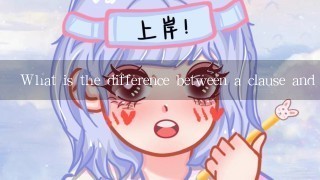What is the difference between a clause and a phrase?

Sure, here's the difference between a clause and a phrase:
Clause:
- A clause is a group of related words that contains a subject and a predicate.
- The subject is a noun or pronoun that performs the action of the predicate.
- The predicate is a verb or a group of verbs that expresses the action of the clause.
- Clauses can stand alone as a complete thought, even if they are separated by other clauses.
Phrase:
- A phrase is a group of words that performs a specific function in a sentence.
- Phrases can be independent (meaning they can stand alone as a thought) or dependent (meaning they require another phrase to be present).
- Phrases can be used to create different levels of meaning in a sentence.
Here's an example to illustrate the difference between a clause and a phrase:
Sentence:
The dog chased the cat.
Clause:
The dog chased the cat.
Phrase:
The dog chased.
In this sentence, the clause "The dog chased the cat" is a complete thought that contains a subject and a predicate. The phrase "the dog chased" is a part of the clause and performs the action of the verb.





































































